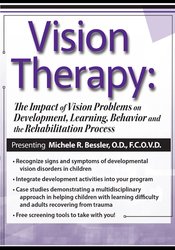
| File type | File name | Number of pages | |
|---|---|---|---|
| Manual (3.96 MB) | 108 Pages | Available after Purchase |
Michele R. Bessler, OD, FCOVD, is a developmental optometrist who is board certified in Vision Development and Vision Therapy and is a Fellow of the College of Optometrists in Vision Development. As the owner and director of Long Island Optometric Vision Development, PLLC, Dr. Bessler provides developmental vision care for both children and adults. She has been in practice for over 20 years and lectures extensively on vision therapy for learning-related vision disorders, and on the visual effects of acquired head trauma and their remediation.
She was assistant clinical professor at SUNY College of Optometry for 12 years, teaching optometry students in the Pediatric, Vision Therapy and Learning Disability Clinics. Dr. Bessler has also worked extensively as clinic supervisor for the Vision Clinic for Children with Special Needs at the University Optometric Center, working with children struggling with a variety of developmental and medical challenges.
Dr. Bessler is a member of the Neuro-Optometric Rehabilitation Association (NORA), American Optometric Association (AOA), NY State Optometric Association (NYSOA), and Optometric Extension Program (OEP). She received her Doctorate in Optometry from the State University of NY State College of Optometry, and completed a residency in Vision Therapy and Vision Rehabilitation from SUNY College of Optometry.
Speaker Disclosures:
Financial: Michele Bessler maintains a private practice. She receives a speaking honorarium from PESI, Inc. She has no relevant financial relationships with ineligible organizations.
Non-financial: Michele Bessler has no relevant non-financial relationship to disclosure.
Access never expires for this product.
| 5 |
|
| 4 |
|
| 3 |
|
| 2 |
|
| 1 |
|
Satisfaction Guarantee
Your satisfaction is our goal and our guarantee. Concerns should be addressed to: PO Box 1000, Eau Claire, WI 54702-1000 or email info@pesi.com.au.
Please wait ...